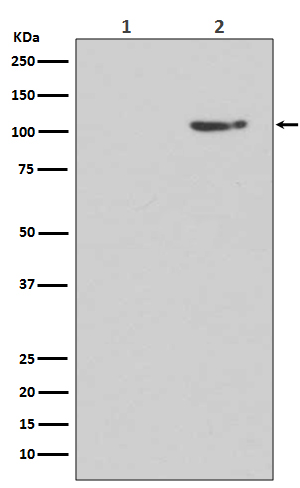Phospho-GluR1 (S845) Antibody
Rabbit mAb
- 产品详情
- 实验流程
Application
| WB |
|---|---|
| Primary Accession | P42261 |
| Reactivity | Rat, Human, Mouse |
| Clonality | Monoclonal |
| Other Names | Glutamate receptor 1; GluR-1; AMPA-selective glutamate receptor 1; GluR-A; GluR-K1; GluRA; GluRK1; Glutamate receptor ionotropic, AMPA 1; GluA1; GRIA1; GLUH1; GLUR1; |
| Isotype | Rabbit IgG |
| Host | Rabbit |
| Calculated MW | 101506 Da |
| Dilution | WB 1:500~1:1000 |
|---|---|
| Purification | Affinity-chromatography |
| Immunogen | A synthesized peptide derived from human GluR1 |
| Description | AMPA- (α-amino-3-hydroxy-5-methyl-4-isoxazolepropionic acid), kainate-, and NMDA- (N-methyl-D-aspartate) receptors are the three main families of ionotropic glutamate-gated ion channels. AMPA receptors (AMPARs) are comprised of four subunits (GluR 1-4), which assemble as homo- or hetero-tetramers to mediate the majority of fast excitatory transmissions in the central nervous system. AMPARs are implicated in synapse formation, stabilization, and plasticity. |
| Storage Condition and Buffer | Rabbit IgG in phosphate buffered saline , pH 7.4, 150mM NaCl, 0.02% sodium azide and 50% glycerol. Store at +4°C short term. Store at -20°C long term. Avoid freeze / thaw cycle. |
| Name | GRIA1 (HGNC:4571) |
|---|---|
| Function | Ionotropic glutamate receptor that functions as a ligand- gated cation channel, gated by L-glutamate and glutamatergic agonists such as alpha-amino-3-hydroxy-5-methyl-4-isoxazolepropionic acid (AMPA), quisqualic acid, and kainic acid (PubMed:1311100, PubMed:20805473, PubMed:21172611, PubMed:28628100, PubMed:35675825). L- glutamate acts as an excitatory neurotransmitter at many synapses in the central nervous system. Binding of the excitatory neurotransmitter L-glutamate induces a conformation change, leading to the opening of the cation channel, and thereby converts the chemical signal to an electrical impulse upon entry of monovalent and divalent cations such as sodium and calcium. The receptor then desensitizes rapidly and enters in a transient inactive state, characterized by the presence of bound agonist (By similarity). In the presence of CACNG2 or CACNG4 or CACNG7 or CACNG8, shows resensitization which is characterized by a delayed accumulation of current flux upon continued application of L- glutamate (PubMed:21172611). Resensitization is blocked by CNIH2 through interaction with CACNG8 in the CACNG8-containing AMPA receptors complex (PubMed:21172611). Calcium (Ca(2+)) permeability depends on subunits composition and, heteromeric channels containing edited GRIA2 subunit are calcium-impermeable. Also permeable to other divalents cations such as strontium(2+) and magnesium(2+) and monovalent cations such as potassium(1+) and lithium(1+) (By similarity). |
| Cellular Location | Cell membrane; Multi-pass membrane protein. Endoplasmic reticulum membrane {ECO:0000250|UniProtKB:P19490}; Multi-pass membrane protein {ECO:0000250|UniProtKB:P19490}. Postsynaptic cell membrane; Multi-pass membrane protein. Postsynaptic density membrane {ECO:0000250|UniProtKB:P23818}; Multi-pass membrane protein {ECO:0000250|UniProtKB:P23818}. Cell projection, dendrite {ECO:0000250|UniProtKB:P23818}. Cell projection, dendritic spine {ECO:0000250|UniProtKB:P23818}. Early endosome membrane {ECO:0000250|UniProtKB:P19490}; Multi-pass membrane protein {ECO:0000250|UniProtKB:P19490}. Recycling endosome membrane {ECO:0000250|UniProtKB:P19490}; Multi-pass membrane protein {ECO:0000250|UniProtKB:P19490}. Presynapse {ECO:0000250|UniProtKB:P23818}. Synapse {ECO:0000250|UniProtKB:P23818} Note=Interaction with CACNG2, CNIH2 and CNIH3 promotes cell surface expression. Colocalizes with PDLIM4 in early endosomes. Displays a somatodendritic localization and is excluded from axons in neurons (By similarity). Localized to cone photoreceptor pedicles (By similarity) {ECO:0000250|UniProtKB:P19490, ECO:0000250|UniProtKB:P23818} |
| Tissue Location | Widely expressed in brain. |
Research Areas
For Research Use Only. Not For Use In Diagnostic Procedures.
Application Protocols
Provided below are standard protocols that you may find useful for product applications.
终于等到您。ABCEPTA(百远生物)抗体产品。
点击下方“我要评价 ”按钮提交您的反馈信息,您的反馈和评价是我们最宝贵的财富之一,
我们将在1-3个工作日内处理您的反馈信息。
如有疑问,联系:0512-88856768 tech-china@abcepta.com.
¥ 1,500.00
Cat# AP90801























 癌症的基本特征包括细胞增殖、血管生成、迁移、凋亡逃避机制和细胞永生等。找到癌症发生过程中这些通路的关键标记物和对应的抗体用于检测至关重要。
癌症的基本特征包括细胞增殖、血管生成、迁移、凋亡逃避机制和细胞永生等。找到癌症发生过程中这些通路的关键标记物和对应的抗体用于检测至关重要。 为您推荐一个泛素化位点预测神器——泛素化分析工具,可以为您的蛋白的泛素化位点作出预测和评分。
为您推荐一个泛素化位点预测神器——泛素化分析工具,可以为您的蛋白的泛素化位点作出预测和评分。 细胞自噬受体图形绘图工具为你的蛋白的细胞受体结合位点作出预测和评分,识别结合到自噬通路中的蛋白是非常重要的,便于让我们理解自噬在正常生理、病理过程中的作用,如发育、细胞分化、神经退化性疾病、压力条件下、感染和癌症。
细胞自噬受体图形绘图工具为你的蛋白的细胞受体结合位点作出预测和评分,识别结合到自噬通路中的蛋白是非常重要的,便于让我们理解自噬在正常生理、病理过程中的作用,如发育、细胞分化、神经退化性疾病、压力条件下、感染和癌症。






